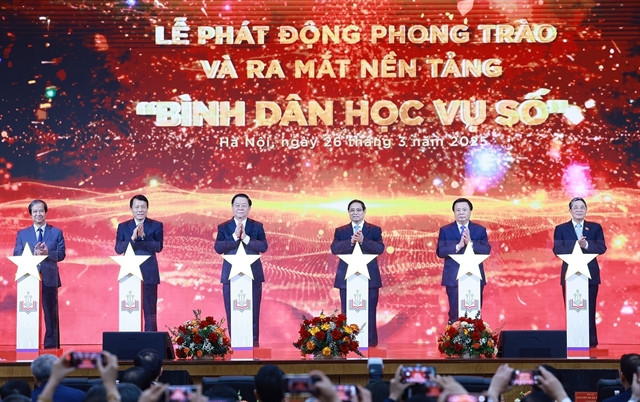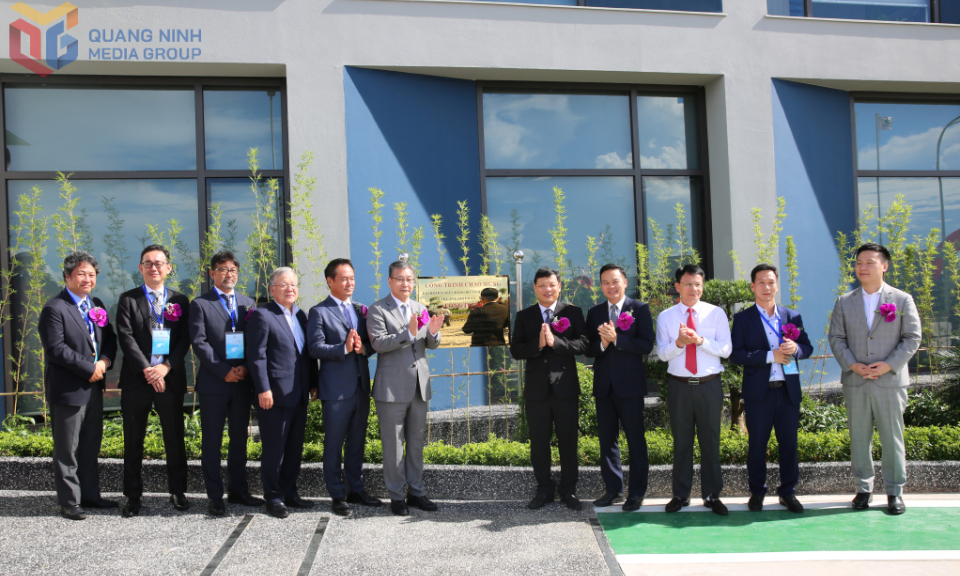Nationwide digital literacy movement launched to empower citizens
Inspired by the historic Bình dân học vụ (Mass Education Movement), which helped eliminate illiteracy after the national revolution, the new Digital Literacy Movement aims to equip all citizens with essential digital knowledge, enabling them to confidently navigate technology in daily life.
Prime Minister Phạm Minh Chính has called for a nationwide push towards digital literacy, declaring it an urgent and strategic necessity as Việt Nam enters a new era - the era of the nation's rise.
Speaking at the launch of the “Digital Literacy Movement” and the introduction of the “Digital Literacy Platform” in Hà Nội on Wednesday, PM Chính emphasised that mastering digital skills is as crucial today as eradicating illiteracy was 80 years ago when the country first gained independence.
Inspired by the historic Bình dân học vụ (Mass Education Movement), which helped eliminate illiteracy after the revolution, the new Digital Literacy Movement aims to equip all citizens with essential digital knowledge, enabling them to confidently navigate technology in daily life and actively participate in developing a digital government, a digital society, a digital economy, and digital citizens.
The "Digital Literacy Platform" at binhdanhocvuso.gov.vn is designed to provide accessible training on fundamental IT skills, safe Internet usage, digital interactions with government services, and protection against online fraud and misinformation.
Through the platform, essential IT knowledge and skills will be taught and supported, with online courses focused on essential digital skills; guidance on using computers, smart devices, social networks, public online services, and interacting with authorities through digital platforms; and instructions on accessing the Internet and digital platforms safely and responsibly to avoid online fraud and safeguard against harmful information in the digital space.
PM Chính underscored the Government’s unwavering commitment to building a smart, modern, and inclusive digital society. Drawing a parallel with Việt Nam’s literacy campaign eight decades ago, he stressed that digital transformation is no longer optional, it is an imperative.
Chính pointed out that 80 years ago, after the country gained independence, more than 95 per cent of the population was illiterate, and the mass education movement was launched to urgently address this issue.
The Prime Minister highlighted Việt Nam’s strides in digital governance, infrastructure, and the digital economy, supported by key platforms such as One Touch, MobiEdu, and the Digital Literacy Platform.
However, he acknowledged gaps in public awareness, policy effectiveness, and the availability of skilled digital professionals, urging a comprehensive approach to overcoming these challenges.
To accelerate digital transformation, PM Chính outlined a clear roadmap. The ultimate goal is to make digital literacy universal, ensuring that every citizen has access to essential digital skills.
He stressed the need to mobilise all resources, drawing on the combined efforts of government agencies, businesses, and the wider community, while fostering Việt Nam’s long-standing culture of learning and innovation.
Policies and mechanisms must be put in place to ensure transparency, accountability, and effective execution, with a strong emphasis on preventing wastefulness and corruption. He also highlighted the need to create a robust digital learning ecosystem, provide incentives for lifelong learning, enhance the capabilities of digital educators, and establish monitoring and evaluation systems to measure progress.
The PM urged all-level authorities to take the lead in improving digital capabilities and promoting digital transformation in their respective regions. He called on socio-political organisations, businesses, and technology firms to play an active role in spreading digital skills, ensuring that every citizen can participate in and benefit from the digital revolution.
He stressed the importance of accelerating the digital skills enhancement project, integrating AI and digital knowledge into education, and upgrading digital infrastructure in rural and remote areas. He called for greater support for disadvantaged communities, ensuring access to digital devices, and fostering local digital communities through digital task forces and family-based digital models.
PM Chính tasked the Ministry of Science and Technology and the Ministry of Education and Training with developing a digital competency framework tailored to different groups, ensuring that civil servants, students, and workers alike have the necessary digital skills to work, learn, and engage safely and effectively in an increasingly digital world.






